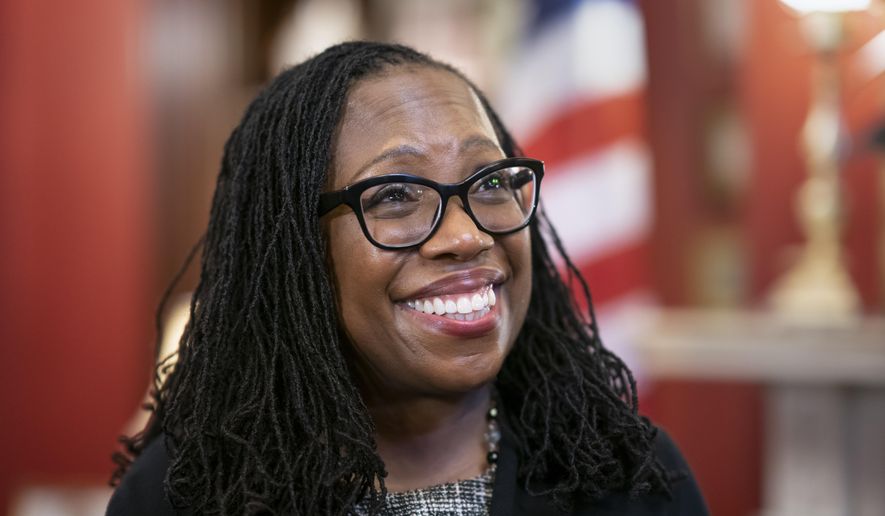mark francis
Well-Known Member
- Joined
- Jan 15, 2021
- Messages
- 17,155
Leftists support woke stupidity because other leftists support leftist woke stupidity. There is no other reason to support the nonsense and those who do support the nonsense should be ashamed of themselves.
https://www.washingtontimes.com/new...FEbbmfoPxLwXRBXGGxXvQCHeE&bt_ts=1677250241289

Kansas kicks off push to define ‘woman,’ as red states seek to shield single-sex spaces
https://www.washingtontimes.com/
Then-Supreme Court nominee Judge Ketanji Brown Jackson smiles on Capitol Hill in Washington, March 31, 2022. Supreme Court Justice Ketanji Brown Jackson is working on a memoir. Jackson, the first Black woman appointed to the court, is calling the book … more >
By Valerie Richardson - The Washington Times - Thursday, February 23, 2023
Legislators in red states are determined this year to do what Supreme Court Justice Ketanji Brown Jackson could not: provide a definition of the word “woman.”
The Kansas Senate on Thursday became the first chamber to pass the Women’s Bill of Rights, a measure that defines “woman” and “man” in state law. The distinction is central to the push to preserve single-sex areas such as public restrooms, school sports, prisons and shelters.
“What this does is simply codify in the law the definition of sex,” state Sen. Renee Erickson, a Republican, told The Washington Times.
The measure is opposed by transgender rights advocates, although Ms. Erickson stressed that “it does not deal with gender identity.”
“It simply says that in existing statute or law, where there is a definition of sex, it means biological male and female as determined at birth. That’s very factual, it’s very objective,” she said.
Under the bill, a person’s biological sex is determined at birth. “Female” is defined as someone “whose biological reproductive system is developed to produce ova,” and “male” refers to those “whose biological reproductive system is developed to fertilize the ova of a female.”
Similar measures have been introduced this year in Oklahoma, New Hampshire, North Dakota, Tennessee and Texas. In South Carolina, the legislature is considering a joint resolution that would amend the state constitution to define sex as biological sex at birth.
Figuring out what “woman” means became a political hot potato last year after Justice Jackson said at her confirmation hearing that she couldn’t provide a definition. A few months later, conservative pundit Matt Walsh released his documentary “What Is a Woman?” mocking the gender identity movement.
Ms. Erickson called Senate Bill 180 “a commonsense approach to this issue,” but Kansas Democrats clearly disagree.
The legislation passed on a party-line vote of 26-10 with no Democratic support. Senate Democrats blasted the measure as “another bill targeting trans Kansans.” They noted that legislators also advanced measures banning gender transition procedures for minors and biological males from female scholastic sports.
“This is part of a national push to put biologically essentialist language in statute so that legislators have [a] basis to ban trans people from public spaces,” Kansas Senate Democrats said in a statement on Twitter.
The American Civil Liberties Union said the bill “codifies into law a right to exclude transgender people based on outdated and inaccurate definitions of sex and families.”
Kansas state Sen. Pat Pettey, a Democrat, took issue with the measure’s name as the Women’s Bill of Rights.
“As we heard in committee, it might be better if we were talking about the things that would help women’s rights, and that would be equity in pay, access to child care, and considering our human rights being balanced between men and women,” she said on the Senate floor. “I think this is poor legislation, unnecessary and does nothing to talk about women’s rights.”
In case you were concerned that #ksleg politicians had come up with this themselves, have no fear: this is part of a national push to put biologically essentialist language in statute so that legislators have basis to ban trans people from public spaces. https://t.co/J9DyiJ6ChR
— Kansas Senate Democrats (@kssenatedems) February 22, 2023
The Women’s Bill of Rights was conceived last year as model legislation by two groups at opposite ends of the political spectrum: the conservative Independent Women’s Voice and the left-wing Women’s Liberation Front.
They may agree on little else, but both are alarmed by the growing campaign to allow biological males into sex-segregated female spaces based on gender identity in the name of transgender rights.
Jennifer C. Braceras, director of the Independent Women’s Law Center, the legal advocacy arm of the Independent Women’s Forum and Independent Women’s Voice, said the bill doesn’t change the law but rather “freezes it in place.”
“It codifies the current constitutional jurisprudence and the intermediate scrutiny standard that we’ve all come to rely on to protect women’s rights, but also to recognize that there are certain situations in which men and women can be separated without violating the constitution,” she said. “Bathrooms, prisons, sports, domestic-violence shelters, etc.”
At the same time, the bill doesn’t prevent the Legislature from passing anti-discrimination measures protecting people who identify as the opposite sex in areas such as employment.
“If Kansas wanted to pass a law to protect trans-identified people from discrimination in the workplace, for example, Kansas could do that,” Ms. Braceras said. “The Women’s Bill of Rights, by clarifying the definition of sex in existing law, prevents unelected judges or administrative bureaucrats from changing the meaning of words without the consent of the governed.”
The American Civil Liberties Union said the bill is “essentially attempting to remove trans people from athletics, restrooms, locker rooms, domestic violence shelters, and other necessary spaces,” but Ms. Erickson argued that it is appropriate in many cases.
“There are legitimate reasons to distinguish between the sexes with respect to prisons, domestic violence shelters, rape crisis centers and other areas where safety and privacy are needed,” she said. “This bill does not create any new rights or entitlements. It simply codifies the definition of sex as biological male and female in existing statutes and laws.”
The bill is expected to clear the Republican-controlled House but not the desk of Kansas Gov. Laura Kelly, a Democrat. The governor, who was reelected in November, previously vetoed two bills that would have banned male-born competitors who identify as female from girls’ sports.
“We do have a Democratic governor, and we fully expect that she will veto this bill, which just goes to show her extreme position on this,” Ms. Erickson said. “It does not reflect the majority of the people of Kansas. The people want this. It’s common sense. It’s the right thing to do.”
Supporters of the legislation hope Ms. Kelly listens to the voters. The Independent Women’s Forum said a poll commissioned by the group found that 80% of Kansas respondents “think it is important that Kansas pass a law to define sex-based terms,” including “man,” “woman,” “female” and “male.”
The poll also found that 86% of Kansas respondents “believe single-sex spaces should be preserved where safety or fairness require.”
“Democrats should be able to support this,” Ms. Braceras said. “I don’t know if the Democratic governor is going to veto it or not. She shouldn’t, is the reality. If she does veto it, it really will tell you something about how far out of the mainstream she is. This shouldn’t be controversial.”
https://www.washingtontimes.com/new...FEbbmfoPxLwXRBXGGxXvQCHeE&bt_ts=1677250241289

Kansas kicks off push to define ‘woman,’ as red states seek to shield single-sex spaces
https://www.washingtontimes.com/
Then-Supreme Court nominee Judge Ketanji Brown Jackson smiles on Capitol Hill in Washington, March 31, 2022. Supreme Court Justice Ketanji Brown Jackson is working on a memoir. Jackson, the first Black woman appointed to the court, is calling the book … more >
By Valerie Richardson - The Washington Times - Thursday, February 23, 2023
Legislators in red states are determined this year to do what Supreme Court Justice Ketanji Brown Jackson could not: provide a definition of the word “woman.”
The Kansas Senate on Thursday became the first chamber to pass the Women’s Bill of Rights, a measure that defines “woman” and “man” in state law. The distinction is central to the push to preserve single-sex areas such as public restrooms, school sports, prisons and shelters.
“What this does is simply codify in the law the definition of sex,” state Sen. Renee Erickson, a Republican, told The Washington Times.
The measure is opposed by transgender rights advocates, although Ms. Erickson stressed that “it does not deal with gender identity.”
“It simply says that in existing statute or law, where there is a definition of sex, it means biological male and female as determined at birth. That’s very factual, it’s very objective,” she said.
Under the bill, a person’s biological sex is determined at birth. “Female” is defined as someone “whose biological reproductive system is developed to produce ova,” and “male” refers to those “whose biological reproductive system is developed to fertilize the ova of a female.”
Similar measures have been introduced this year in Oklahoma, New Hampshire, North Dakota, Tennessee and Texas. In South Carolina, the legislature is considering a joint resolution that would amend the state constitution to define sex as biological sex at birth.
Figuring out what “woman” means became a political hot potato last year after Justice Jackson said at her confirmation hearing that she couldn’t provide a definition. A few months later, conservative pundit Matt Walsh released his documentary “What Is a Woman?” mocking the gender identity movement.
Ms. Erickson called Senate Bill 180 “a commonsense approach to this issue,” but Kansas Democrats clearly disagree.
The legislation passed on a party-line vote of 26-10 with no Democratic support. Senate Democrats blasted the measure as “another bill targeting trans Kansans.” They noted that legislators also advanced measures banning gender transition procedures for minors and biological males from female scholastic sports.
“This is part of a national push to put biologically essentialist language in statute so that legislators have [a] basis to ban trans people from public spaces,” Kansas Senate Democrats said in a statement on Twitter.
The American Civil Liberties Union said the bill “codifies into law a right to exclude transgender people based on outdated and inaccurate definitions of sex and families.”
Kansas state Sen. Pat Pettey, a Democrat, took issue with the measure’s name as the Women’s Bill of Rights.
“As we heard in committee, it might be better if we were talking about the things that would help women’s rights, and that would be equity in pay, access to child care, and considering our human rights being balanced between men and women,” she said on the Senate floor. “I think this is poor legislation, unnecessary and does nothing to talk about women’s rights.”
In case you were concerned that #ksleg politicians had come up with this themselves, have no fear: this is part of a national push to put biologically essentialist language in statute so that legislators have basis to ban trans people from public spaces. https://t.co/J9DyiJ6ChR
— Kansas Senate Democrats (@kssenatedems) February 22, 2023
The Women’s Bill of Rights was conceived last year as model legislation by two groups at opposite ends of the political spectrum: the conservative Independent Women’s Voice and the left-wing Women’s Liberation Front.
They may agree on little else, but both are alarmed by the growing campaign to allow biological males into sex-segregated female spaces based on gender identity in the name of transgender rights.
Jennifer C. Braceras, director of the Independent Women’s Law Center, the legal advocacy arm of the Independent Women’s Forum and Independent Women’s Voice, said the bill doesn’t change the law but rather “freezes it in place.”
“It codifies the current constitutional jurisprudence and the intermediate scrutiny standard that we’ve all come to rely on to protect women’s rights, but also to recognize that there are certain situations in which men and women can be separated without violating the constitution,” she said. “Bathrooms, prisons, sports, domestic-violence shelters, etc.”
At the same time, the bill doesn’t prevent the Legislature from passing anti-discrimination measures protecting people who identify as the opposite sex in areas such as employment.
“If Kansas wanted to pass a law to protect trans-identified people from discrimination in the workplace, for example, Kansas could do that,” Ms. Braceras said. “The Women’s Bill of Rights, by clarifying the definition of sex in existing law, prevents unelected judges or administrative bureaucrats from changing the meaning of words without the consent of the governed.”
The American Civil Liberties Union said the bill is “essentially attempting to remove trans people from athletics, restrooms, locker rooms, domestic violence shelters, and other necessary spaces,” but Ms. Erickson argued that it is appropriate in many cases.
“There are legitimate reasons to distinguish between the sexes with respect to prisons, domestic violence shelters, rape crisis centers and other areas where safety and privacy are needed,” she said. “This bill does not create any new rights or entitlements. It simply codifies the definition of sex as biological male and female in existing statutes and laws.”
The bill is expected to clear the Republican-controlled House but not the desk of Kansas Gov. Laura Kelly, a Democrat. The governor, who was reelected in November, previously vetoed two bills that would have banned male-born competitors who identify as female from girls’ sports.
“We do have a Democratic governor, and we fully expect that she will veto this bill, which just goes to show her extreme position on this,” Ms. Erickson said. “It does not reflect the majority of the people of Kansas. The people want this. It’s common sense. It’s the right thing to do.”
Supporters of the legislation hope Ms. Kelly listens to the voters. The Independent Women’s Forum said a poll commissioned by the group found that 80% of Kansas respondents “think it is important that Kansas pass a law to define sex-based terms,” including “man,” “woman,” “female” and “male.”
The poll also found that 86% of Kansas respondents “believe single-sex spaces should be preserved where safety or fairness require.”
“Democrats should be able to support this,” Ms. Braceras said. “I don’t know if the Democratic governor is going to veto it or not. She shouldn’t, is the reality. If she does veto it, it really will tell you something about how far out of the mainstream she is. This shouldn’t be controversial.”


![kids+laughing[1].jpg kids+laughing[1].jpg](https://www.houseofpolitics.com/data/attachments/3/3266-669611be60c6f349cdc7e748d8b6d70a.jpg)
